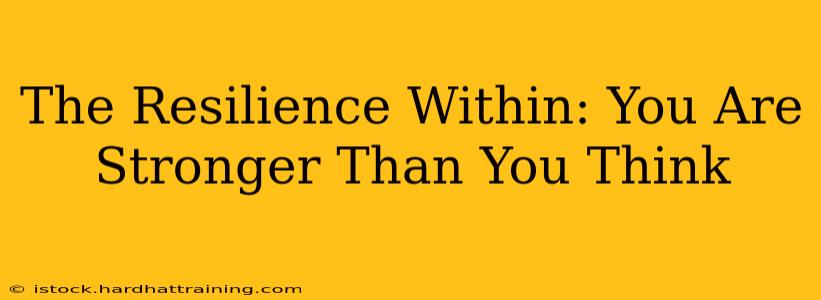We all face challenges. Life throws curveballs, unexpected setbacks, and moments that test our limits. But within each of us lies a wellspring of resilience – a capacity to bounce back, adapt, and thrive even in the face of adversity. This isn't about ignoring hardship; it's about understanding the incredible strength you already possess and learning how to harness it. This article will explore the nature of resilience, its building blocks, and how you can cultivate it within yourself.
What is Resilience?
Resilience isn't about being immune to hardship. It's not about never experiencing pain, grief, or disappointment. Instead, it's the ability to navigate these difficult experiences, learn from them, and emerge stronger on the other side. It's about adapting to change, bouncing back from setbacks, and maintaining a positive outlook even when things get tough. Think of it as the mental and emotional flexibility that allows you to weather life's storms.
How Do I Know if I'm Resilient?
Identifying your own resilience can be helpful in understanding your strengths and areas for growth. Are you able to:
- Bounce back from setbacks: Do you tend to get back up after a fall, learning from your mistakes rather than dwelling on them?
- Adapt to change: Can you adjust to new situations and challenges with relative ease?
- Maintain a positive outlook: Even when facing difficulties, do you try to find the silver linings and maintain hope?
- Manage stress effectively: Do you have healthy coping mechanisms for managing stress and anxiety?
- Build strong relationships: Do you have a supportive network of friends and family who can offer you encouragement and assistance during tough times?
If you answered yes to most of these, you're likely already quite resilient. If not, don't worry; resilience is a skill that can be learned and strengthened over time.
What are the Building Blocks of Resilience?
Several key factors contribute to a person's overall resilience:
- Positive self-belief: A strong sense of self-worth and confidence in your abilities is crucial. Believing in your capacity to overcome challenges fuels your efforts.
- Optimism: Maintaining a hopeful outlook, even amidst adversity, is essential. Optimism allows you to see possibilities and opportunities where others might only see obstacles.
- Strong social connections: A supportive network of friends, family, and community provides emotional support, practical assistance, and a sense of belonging.
- Effective problem-solving skills: The ability to analyze situations, identify solutions, and take action is vital for navigating challenges.
- Self-care practices: Prioritizing your physical and mental well-being through healthy habits (exercise, nutrition, sleep) builds your overall capacity to cope with stress.
How Can I Build My Resilience?
Cultivating resilience is a journey, not a destination. Here are some practical strategies to help you build your inner strength:
- Practice self-compassion: Be kind to yourself during difficult times. Treat yourself with the same understanding and support you would offer a friend.
- Develop healthy coping mechanisms: Learn effective ways to manage stress and difficult emotions, such as meditation, yoga, journaling, or spending time in nature.
- Set realistic goals: Break down large challenges into smaller, more manageable steps. Celebrating small victories along the way builds momentum and confidence.
- Learn from setbacks: View challenges as opportunities for growth and learning. Analyze what went wrong, what you can learn, and how you can improve in the future.
- Seek support: Don't hesitate to reach out to friends, family, or professionals for help and support when you need it.
What if I'm struggling with building resilience?
It's perfectly normal to struggle with building resilience, especially if you've experienced significant trauma or adversity. If you find yourself consistently overwhelmed by challenges or struggling to cope, seeking professional help is a sign of strength, not weakness. A therapist or counselor can provide you with personalized strategies and support to build your resilience and develop healthy coping mechanisms.
Is resilience something I'm born with, or can it be learned?
Resilience is a combination of innate traits and learned skills. While some individuals may naturally possess certain characteristics that contribute to resilience, it's a skill that can be significantly strengthened and developed through conscious effort and practice. It's a muscle that gets stronger with use.
How can I help others build their resilience?
Supporting others in building their resilience involves empathy, understanding, and active listening. Offer encouragement, celebrate their small victories, and help them identify their strengths. Remind them that setbacks are a normal part of life and that they are capable of overcoming challenges. Sometimes, just being present and offering a listening ear can make a significant difference.
By understanding the nature of resilience and actively practicing the strategies outlined above, you can tap into your inner strength and navigate life's challenges with greater confidence and ease. Remember, you are stronger than you think. Embrace your resilience and watch yourself grow.
